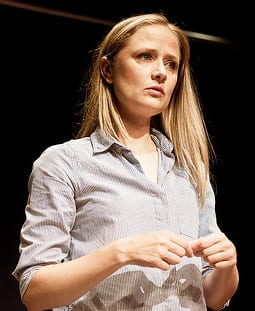Transcription of an Interview with Seth Barrish and Sidse Ploug Soerensen
March 5th 2015
SB: How did you find out about The Barrow Group?
Sidse: I saw “Short Stuff,” I think it was in 2004, and I was beyond excited about the aesthetic, the simplicity and the immediacy that I was experiencing. It was exactly the kind of theater I had always wanted to do and didn’t always get to. So I started studying here.
SB: And then, as I recall, you took the solo show workshop?
Sidse: I did, with you. I had written a bunch of monologues at that point and in the solo show class it began taking shape of a one-women show.
SB: And then you and Wendy Herlich did an evening together?
Sidse: Yes, we did our solo shows back to back—Eric Paeper directed it.
SB: Where did you do it?
Sidse: We did it… first we did it at the PIT and then here at The Barrow Group in Studio 3A, and then in the main stage as part of a solo show festival. Then, I did mine again at the PIT.
SB: What is your background?
Sidse: My official training, is as an actor. And I think I write as an actor. My writing is like… improv in my head. And it usually takes me awhile to structure it. I used to not be very interested in the story structure part of the writing process. I think I was scared that being overly concerned about story structure would destroy the immediacy or the innocence of the writing.
SB: What changed that for you?
Sidse: Knowing more, understanding it on a different level. I began to appreciate the importance, the difference it makes when something is truly crafted, structured. The very first play I wrote, started out by me simply generating material without any rewriting. I was working with a theater company in Copenhagen and we couldn’t find a play with parts for every member, so I decided, with a colleague of mine, that we would write a play tailor-made for the company. So, we did and we thought it was the funniest thing ever written, we wrote for ten days straight, high on coffee and coke…coca-cola.
SB: Hardcore stuff
Sidse: Exactly. It was rock and roll. Until we had a reading of it, and it turned out that not everybody shared our…. not everybody thought it was the funniest thing ever written. In fact, nobody did, except for us—we couldn’t stop laughing. It was my first practical lesson in what it means to craft something. It was the first time I understood that story structure is not just an intellectual exercise.
SB: Your writing is, I’d say, comedically orientated. I think it has its substantive side as well, It’s not just wacka-wacka. but it’s definitely comedic. Why is that? Is that where your interests lie?
Sidse: I often think back to one of my very first theatre experiences… as a little person, four or five years old, going with my kindergarten class to see Children’s Theatre, you know, sitting on the floor, with a bunch of other kids. I don’t remember the play, but I remember that there was this enormous bear who ran around doing mischievous stuff, like bears do, you know? The other actors were chasing the bear, and there was one scene where this gigantic bear was hiding behind a stool, a little tiny stool, and one of the other characters, a full grown man, came out and asked, yelled, for help to find the bear. “Where did he go, Where is he?” And all the kids were screaming enthusiastically “He’s right there! He’s behind the stool!”
SB: Except they said it in Danish.
Sidse: Yeah. (Speaks in Danish). But while the other kids were screaming, I was busy wondering, Am I the only one who see what’s going on? Why is this full-grown man not able to see this gigantic bear? Why is nobody talking about that? I get… suspension of disbelief and everything, but come on! There was stuff going on, something was off, and nobody was addressing it. Right?
SB: So what does that have to do with….?
Sidse: Well, I think I often write about that. In my plays, there are things that are obvious to the viewer and yet hidden to the characters.
SB: And so you got that going on in you’re writing, where there is this dilemma that’s apparent to the audience, but not to the characters?
Sidse: Yes.
SB: And then it just comes out in a funny tone because of your world view … or just the way you… I mean, I do notice in real life you have a wonderful sense of humor, —you goof around a lot. It’s a go-to thing for you. Is that it?
Sidse: I think so, and also, I love the power of laughing together and laughing at the same time—getting that sense of ‘we got that’ and at the same time. That kind of laughter…it’s a shared experience. It’s a palpable way of knowing that you’re not alone.
SB: Uh huh. Prior to being an actor, you had dance training. Was it ballet?
Sidse: Yes. I was at The Danish Ballet Theatre and The Danish Royal Theatre in Copenhagen since I was five.
SB: Ok. And for how long?
Sidse: For about thirteen years. I was part of a company and loved it. We got to perform a couple of shows a year, so we were practically always rehearsing or doing a show, along with the training.
SB: And then at some point you studied with Philippe Gaulier?
Sidse: Yes. I studied at the The Drama School in Copenhagen first and then I studied with Philippe Gaulier in London.
SB: Ok. And I guess the reason I ask is there is something, and I think it’s a more than a good thing in your performing, there’s kind of a clownish or “other than” element that’s very funny that shows up. Do you think that’s a by-product of training? Or that it’s just kind of who you are?
Sidse: That’s a good question… I’m not sure…
SB: Did you enjoy the clowning training that you had?
Sidse: I was too young at the time. I think I was too young to appreciate the potential. Today, I really appreciate that training, but back then I found it a little sort of rough, unsophisticated.
SB: Now when you did a show at Ars Nova, was that a solo show?
Sidse: It was a comedy show, vignettes. I did have another actor in most of the pieces so it wasn’t a solo show.
SB: But you were all the parts…
Sidse: Yes
SB: Do you ever do audience interaction where you… I’m not saying you should just if you ever did…
Sidse: No. No.
SB: That’s the next show.
Sidse: I could do the one with the bear. I think I like to know, what’s… you know…what I’m dealing with…
SB: What do you like about doing your art here versus doing it in Denmark?
Sidse: Here at The Barrow Group? Or here in the states?
SB: Either. Why do it here?
Sidse: I just fell in love with New York and The Barrow Group was a big part of that. It mirrored so much of what I believed in. The sense of being able to trust, agreeing with…. and trusting the aesthetic, it’s been invaluable for me as a performer and writer.
SB: I think the Barrow Group is completely enriched by your writing because your voice is unique and from our end, it also feels like a good fit. What is it that you found that you loved so much about New York?
Sidse: I think the fact that it’s so varied. At least this is my experience as an foreigner, that there isn’t a consensus to, you know, ‘this is how we do it’, ‘this is what we do’, ‘this is what it means to be a…’, I think… it’s freeing.
SB: Do you think your Danish background informs what you do? Is there something about what you do that, just by virtue of your upbringing and the culture you were raised in, expresses itself in your work?
Sidse: Yes, I think so. I think coming from such a small country—it’s five point something million people—you can allow yourself to not be so broad—because not that many people need to understand the references. Whereas I think in America, the humor sometimes tends to be a little broader, because it needs to include, you know, a couple more people. My sense of humor is probably on the more narrow….
SB: You mean that the subject matter is… ?
Sidse: I think I allow myself to talk about more interpersonal situations, and trust that it’s universal. And not like…
SB: World Politics?…
Sidse: Yeah. Not so much.
SB: Is there anything that goes on language wise, in other words, do you have a sense that your understanding and use of English is pretty much the same as anybody’s or is it different— being that it is a second language?
Sidse: I think so. I think you’re always going to be a bit of an outsider to the language. And it has its disadvantages. But maybe it has…
SB: Because I can think of some advantages.
Sidse: Like an innocence?
SB: Yeah, maybe. I know, your writing, to me, is….unique. I can read it off the page and go, that’s a very specific voice. It doesn’t sound exactly like anybody else’s.
Sidse: That’s about to change, I’m …my next play it’s going to sound exactly like Shakespeare’s.

